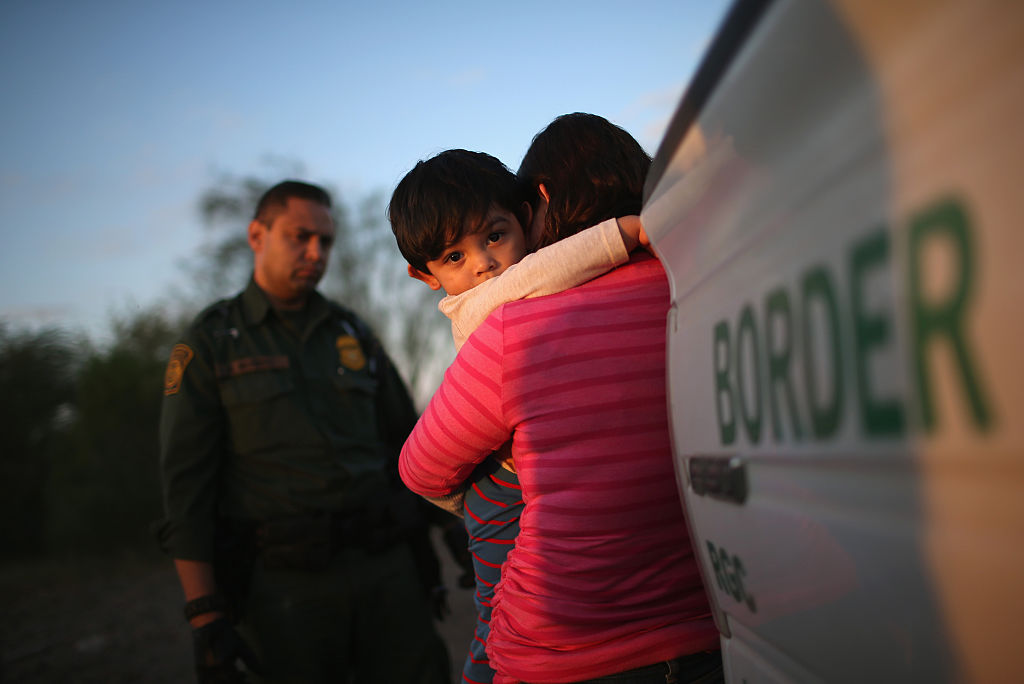Has America lost its empathy?
Why Trump's immigration crackdown is inhumane


A free daily email with the biggest news stories of the day – and the best features from TheWeek.com
You are now subscribed
Your newsletter sign-up was successful
"Picking up this trash that somebody left on the trail. It's not yours, is it?" the smirking Border Patrol officer asked the person with the camera, as he poured gallons of water from plastic bottles onto the scorching earth near the U.S.-Mexico border.
Footage of the water wasting, released recently by the Arizona-based multi-faith humanitarian group No More Deaths, was part of a 90-second montage of Border Patrol agents sabotaging or destroying food and water left for migrants stranded in the expansive desert border region. Mere hours after the video was released, No More Deaths volunteer (and Arizona State University instructor) Scott Warren was arrested on federal charges of harboring undocumented immigrants.
Warren was nabbed after Border Patrol agents surveilled a building known as "The Barn" — familiar to migrants crossing the Southern border as a place that provides temporary shelter — where Warren is accused of providing at least two migrants with water, food, clean clothes, and beds for three days. According to The Intercept, "The government is now relying on the migrants as material witnesses in its case against Warren."
The Week
Escape your echo chamber. Get the facts behind the news, plus analysis from multiple perspectives.

Sign up for The Week's Free Newsletters
From our morning news briefing to a weekly Good News Newsletter, get the best of The Week delivered directly to your inbox.
From our morning news briefing to a weekly Good News Newsletter, get the best of The Week delivered directly to your inbox.
Immigration hardliners might argue that such law enforcement tactics and targeted arrests are proper tools in defense of the homeland from an invasion of criminals and potential welfare state leeches — as well as effective disincentives for any traitorous Good Samaritans thinking about going rogue. After all, President Trump didn't win his job by promising a kinder, gentler immigration enforcement regime.
But well before Trump took office, a 2016 study commissioned by the Department of Homeland Security warned of corrupt Border Patrol officers in league with cartels posing a "national security threat" and a "broken" disciplinary system whose investigation and enforcement procedures take "far too long to be an effective deterrent" against the use of "unlawful and unconstitutional force" — including physical and sexual abuse.
That enforcement has only taken a harder edge under the Trump administration, and in recent weeks the increasingly callous and sometimes flagrantly unconstitutional nature of immigration enforcement has been thrust into the national spotlight.
Greyhound bus passengers in Fort Lauderdale got a taste of the new normal last week, when U.S. Customs and Border Protection (CBP) agents boarded and demanded proof of residency from every single passenger. When they came across a woman of Caribbean heritage who could not provide the requisite documentation, they arrested her. Video of the woman's arrest subsequently went viral, with many wondering if the Fourth Amendment protection against unreasonable search and seizure (there was no crime being investigated, yet the passengers were all placed under generalized suspicion) doesn't apply to mass transportation.
A free daily email with the biggest news stories of the day – and the best features from TheWeek.com
The sad fact is, in Florida, it doesn't. That's because Florida is mostly a peninsula, and a 1953 regulation imposed by the Department of Justice — without any public debate — grants the Border Patrol jurisdiction within 100 miles of all federal borders, including oceans. That's pretty much the whole state of Florida.
And as the American Civil Liberties Union (ACLU) notes, approximately two-thirds of the U.S. population lives within 100 miles of a border, meaning most Americans lack constitutional protections against Border Patrol searches. This presents a conundrum for illegal immigration hard-liners because if a federal bureaucracy's regulation can trump the Constitution, we're not living under "law and order," but instead subject to "arbitrary regulation with no redress," which doesn't sound quite as comforting.
To be very clear, there is nothing inherently racist or xenophobic about demanding secure borders and robust immigration enforcement. But even the most strident immigration hawks would be remiss if they did not consider the heartlessness inherent in much of the recent crackdown.
Consider the deportation of Jorge Garcia, who came to the U.S. from Mexico 30 years ago at the age of 10, worked hard and amassed no criminal record, but who is now separated from his wife and two children in Michigan by thousands of miles.
Or 19-year-old Dylan O'Riordan, Irish born but living in the Boston area since he was 12, now detained for months by ICE and on a fast track to deportation.
Or Lucasz Niec — a doctor, green card holder, and possible U.S. citizen — who may very well be deported to his native Poland (whose language Niec does not speak) over two misdemeanor convictions when he was a teenager.
How about the confounding optics — in a country that values religious freedom to a degree unmatched anywhere in the world — of agents of the federal government targeting churches for providing sanctuary to the undocumented?
Compared to the outrage over President Trump's reported utterance of the word "shithole" to describe the native countries of immigrants he considers undesirable, the inhumanity of the ongoing immigration crackdown — which even leads to military veterans (national heroes in any other context) being kicked out of the country — barely registers in the public consciousness.
Even the president's base can't seem to make up its mind as to its immigration priorities. Rejecting Trump's proposal for substantial cuts in legal immigration and a huge infusion of cash for border enforcement, Breitbart News has dubbed the president "Amnesty Don," because his proposal includes a path to citizenship for the "DREAMers" — over 2 million people who came to the U.S. as children.
It is increasingly hard to find justifications for such an intractable view on immigration, where everyone from legal immigrants to undocumented immigrants who were brought to this country through no fault of their own to desperately impoverished people risking life and limb for a shot at the American dream are treated as sinister marauders.
Even the strictest immigration hardliner should take pause before high-fiving such heavy-handedness from armed agents of the state, or before licking their lips in satisfaction at so much human suffering.
Sadism won't ever make America great.
Anthony L. Fisher is a journalist and filmmaker in New York with work also appearing at Vox, The Daily Beast, Reason, New York Daily News, Huffington Post, Newsweek, CNN, Fox News Channel, Sundance Channel, and Comedy Central. He also wrote and directed the feature film Sidewalk Traffic, available on major VOD platforms.
-
 Political cartoons for February 15
Political cartoons for February 15Cartoons Sunday's political cartoons include political ventriloquism, Europe in the middle, and more
-
 The broken water companies failing England and Wales
The broken water companies failing England and WalesExplainer With rising bills, deteriorating river health and a lack of investment, regulators face an uphill battle to stabilise the industry
-
 A thrilling foodie city in northern Japan
A thrilling foodie city in northern JapanThe Week Recommends The food scene here is ‘unspoilt’ and ‘fun’
-
 The billionaires’ wealth tax: a catastrophe for California?
The billionaires’ wealth tax: a catastrophe for California?Talking Point Peter Thiel and Larry Page preparing to change state residency
-
 Bari Weiss’ ‘60 Minutes’ scandal is about more than one report
Bari Weiss’ ‘60 Minutes’ scandal is about more than one reportIN THE SPOTLIGHT By blocking an approved segment on a controversial prison holding US deportees in El Salvador, the editor-in-chief of CBS News has become the main story
-
 Has Zohran Mamdani shown the Democrats how to win again?
Has Zohran Mamdani shown the Democrats how to win again?Today’s Big Question New York City mayoral election touted as victory for left-wing populists but moderate centrist wins elsewhere present more complex path for Democratic Party
-
 Millions turn out for anti-Trump ‘No Kings’ rallies
Millions turn out for anti-Trump ‘No Kings’ ralliesSpeed Read An estimated 7 million people participated, 2 million more than at the first ‘No Kings’ protest in June
-
 Ghislaine Maxwell: angling for a Trump pardon
Ghislaine Maxwell: angling for a Trump pardonTalking Point Convicted sex trafficker's testimony could shed new light on president's links to Jeffrey Epstein
-
 The last words and final moments of 40 presidents
The last words and final moments of 40 presidentsThe Explainer Some are eloquent quotes worthy of the holders of the highest office in the nation, and others... aren't
-
 The JFK files: the truth at last?
The JFK files: the truth at last?In The Spotlight More than 64,000 previously classified documents relating the 1963 assassination of John F. Kennedy have been released by the Trump administration
-
 'Seriously, not literally': how should the world take Donald Trump?
'Seriously, not literally': how should the world take Donald Trump?Today's big question White House rhetoric and reality look likely to become increasingly blurred
